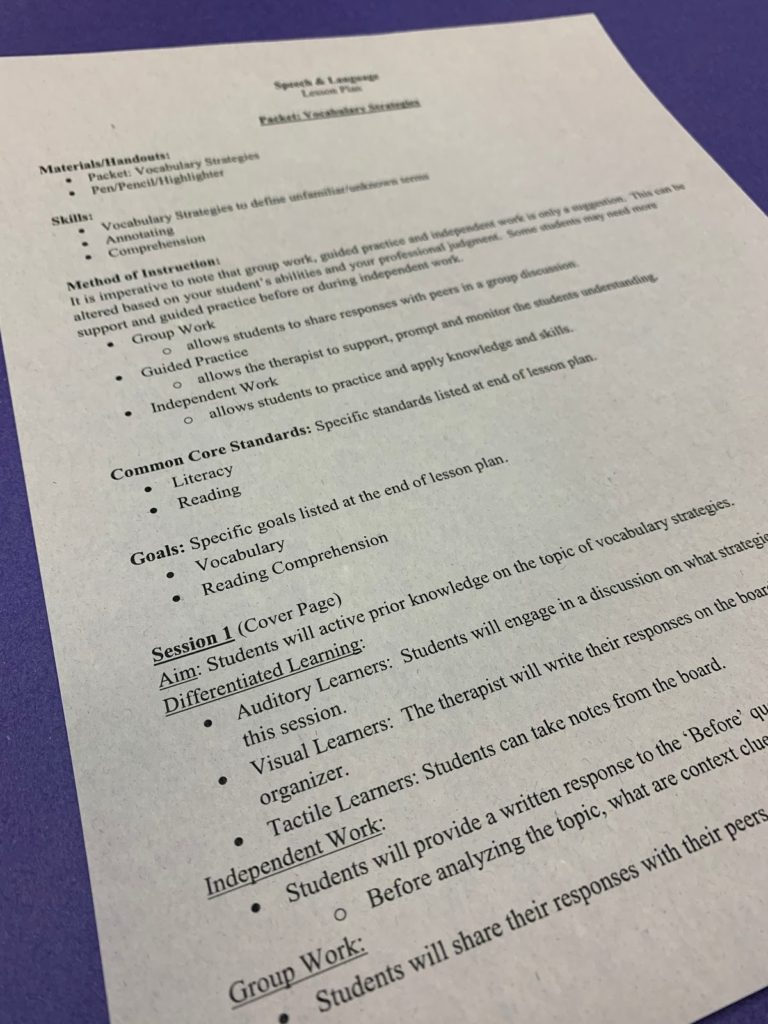Lesson Planning for High School Speech Therapy

Lesson planning is easy, enjoyable, and quick…said nobody ever! Lesson planning is a reality for teachers everywhere. Speech-Language Pathologists are definitely no strangers to the importance of lesson planning. We all take undergraduate, graduate, and post-graduate classes that focus on lesson planning. In truth, lesson planning can vary depending on the environment you work in. All three of us have worked for agencies and now we are in public schools. In the private agencies, lesson planning was less formal but something that still needed to be accomplished on a daily basis. The alternative would leave you suffering through a day of seeing possibly 20-30 students without a thought in the world of what goals you needed to target as per their IEP. Now that we are in the public school setting, we always need to have a lesson plan at the ready. We are often discussing how there are just not enough hours in the day to “get it all done.” The reality is that paperwork is our priority and takes up most of our non-therapy time. Between writing daily session notes, gathering information to prepare for upcoming IEPs, and writing IEPs – let’s be honest – that’s more than a day’s work!
We’ll be the first to admit that when we first started working in public schools, our lesson plans were not great. They were extremely basic and did not include many details. Truth be told – we were overwhelmed!! When we came together a few years ago, we changed our perspective and decided to take a new approach when it comes to planning our sessions. As many of you know, we really like to organize our speech and language strategies into “packets.” We do this for a few reasons:
- This helps our students stay organized: everything they are currently working on is in one packet.
- This helps us task analyze by breaking down a new strategy or concept which carries throughout the packet.
- This helps our students see the “game plan” so they know what to expect in therapy sessions to come and what the end result will be.
Once we developed our new approach to planning our therapy, we knew it was time to upgrade our lesson plans as well. We decided to “front load” the work so that we would still have time for the daily paperwork and IEP demands. This helps us so that we don’t have to worry on a daily basis about writing lesson plans. We generate the lesson plan for the entire packet prior to starting the packet with the students. We create our packets about one strategy or unit first and then break the packets down into “sessions.”
Each session typically includes:
-
- Aim
- Differentiated Learning
- Evidence Based Practice
- Long Term Goals
- Do Now
- Mini-Lesson
- Group Work
- Guided Practice
- Independent Work
- Closing/Exit Ticket
For example, we might have ten sessions within one “lesson plan,” but it will certainly take us longer than one day to get through all the sessions and we won’t work through every single section of the lesson plan. If some groups are working on different strategies and concepts, we will have a lesson plan to go along with their packets so that our therapy is individualized.
We wanted to show you an example of a typical lesson plan that we use with one of our most popular packets: our Vocabulary Packet. We include a lesson plan similar to the one seen below with every new packet we create.
| Parts in the Session | Example from the Vocabulary Packet |
| Aim | Students will define context clues as a strategy that can be utilized to define unfamiliar vocabulary words. |
| Differentiated Learning | Graphic Organizer, Word Web or Chart, Discussion, Note taking from the board |
| Evidence Based Practice | Nagy, W.E., Anderson, R.C., & Herman, P.A. (1987). Learning word meanings from context during normal reading. American Education Research Journal, 24, 237-270. |
| Long Term Goals | [STUDENT] will determine the meaning of unfamiliar words by utilizing context cues and/or structural analysis (roots, prefixes, and suffixes). |
| Do-Now | Students will provide a written response to the questions: “Before analyzing the topic, what are context clues?” |
| Mini Lesson |
|
| Group Work | Students will take turns reading each type of context clue and description in the graphic organizer
|
| Guided Practice | Context Clues at the Sentence Level
|
| Independent Practice | Context Clues at the Sentence Level
|
| Closing/Exit Ticket | Students will answer the following question: “After learning the new strategy, how will you use context clues when you are unfamiliar with a word?” |
If you follow us on Instagram (which we hope you do since we love sharing photos with you –@nycspeechies) you may have noticed that all of our teacher packets are bound (Binding Machine and Binding Combs). We highly recommend this way of staying organized. It allows you to keep the lesson plan together with the teacher copy of the packet. This is another tip to help you stay organized! This gives us the ability to flip between sessions depending on the group and student we are working with. It is all about organization and how we can be more efficient during a session.
On the same trend of keeping our lesson plans and packets together, we also display the lesson plans and packets together in our room. This is done so the students have an opportunity to see all of the different strategies we have targeted throughout the school year. This is also a great idea just in case someone from administration stops in to our room so we are able to quickly show them the different strategies and topics we have targeted. The way we display our lesson plans/packets is by placing them into the dry erase pockets and putting them on a bulletin board.
Working in the schools can be so overwhelming at times. The days are filled with students, parent outreach, paperwork, IEP writing, department meetings, faculty meetings..the list goes on! We are always looking for ways to make our paperwork feel more manageable. We love what we do and are grateful everyday for our jobs, but it is so nice to have one less item on our daily To-Do List! We have absolutely made our lives easier by planning our lessons this way, and we hope that by sharing our ideas and products we have make your lives easier too!
The link below connects you to a free sample lesson plan that is offered in our TpT store. That lesson plan directly connects to the Argumentative Writing Process and Strategies Bundle!!






